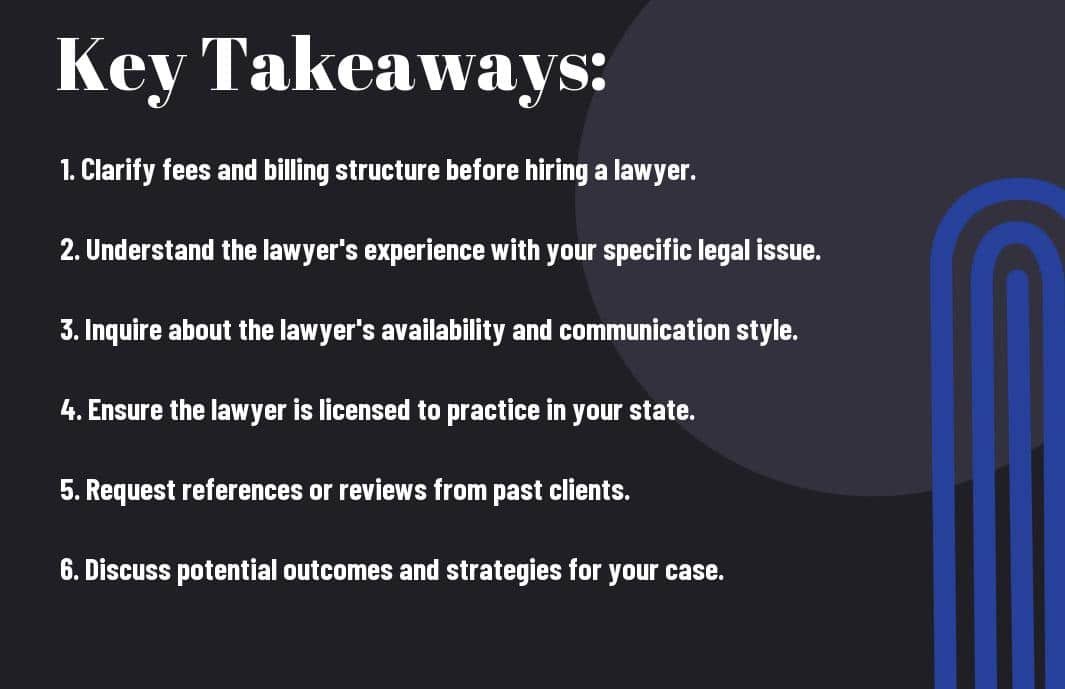With so much at stake, hiring a lawyer is a decision that shouldn’t be taken lightly. It’s crucial to ensure you’re hiring the right person to represent you and your interests. Before making a commitment, here are 10 questions you need to ask to guarantee you’re making the best choice for your specific legal needs. Don’t leave your future up to chance – be prepared, informed, and ready to make the right decision for yourself.
Key Takeaways:
- Ask about experience: Make sure to inquire about the lawyer’s experience in handling cases similar to yours to ensure they have the necessary expertise.
- Discuss communication: Communication is key in any professional relationship, so ask how the lawyer prefers to communicate and how often they will update you on your case.
- Clarify fees and billing: Understanding the lawyer’s fee structure upfront can help you avoid surprises later on, so be sure to discuss fees and billing practices before hiring.

The Vetting Process: Getting Real With Your Potential Legal Guru
What’s Your Winning Ratio?
Before you hire a lawyer, it’s crucial to ask about their winning ratio. Knowing how many cases they’ve won versus lost can give you valuable insight into their track record and expertise. Don’t be afraid to dig deep and ask for specific examples of cases similar to yours that they have successfully handled. Transparency in this area is key to ensuring you are hiring a legal guru who can truly deliver results for you.
Can I Get That Specialized Knowledge Deep Dive?
Getting that specialized knowledge deep dive is necessary when vetting a potential lawyer. One of the most critical questions to ask is whether the lawyer has experience handling cases like yours before. Understanding their level of expertise in your specific legal issue can make a significant difference in the outcome of your case. Don’t settle for a general practitioner when you need specialized knowledge to navigate complex legal matters.
Knowledge
When hiring a lawyer, it’s crucial to remember that not all legal expertise is created equal. Look for a lawyer who has a deep understanding of the specific area of law relevant to your case. Specialized knowledge can give you a significant advantage in the courtroom and ensure that your legal guru is equipped to handle any challenges that may arise. Don’t be afraid to ask detailed questions about their experience and background to ensure they have the expertise needed to represent you effectively.
The Money Talk: Dollars and Sense
Pricing It Out: What’s This Gonna Cost Me?
It’s necessary to have an honest conversation about money when hiring a lawyer. Ask about their fee structure upfront so you know what to expect. Are they billing hourly, or is there a flat fee for their services? Make sure you understand how and when you’ll be billed, and if there are any additional costs to consider.
The Fine Print: Extra Fees or Nah?
An often overlooked aspect of hiring a lawyer is the potential for extra fees. Some lawyers may charge for expenses like filing fees, court costs, or travel expenses. Make sure to clarify with your lawyer if these costs are included in their fee or if they will be billed separately. Understanding the fine print can save you from unexpected financial surprises down the road.
One thing to watch out for is lawyers who may try to upsell you on services you don’t need. Be wary of any attorney who is not transparent about their fees or tries to tack on extra charges without a clear explanation. Recall, the best lawyers will be upfront and honest about all costs from the start.

Working It Out: Chemistry and Communication
The Straight Talk: How Will You Keep Me Posted?
For a successful client-lawyer relationship, communication is key. Ensure your potential lawyer is transparent about their communication style and how they will keep you updated on your case’s progress. Make sure they are responsive to your calls and emails, as you should never feel left in the dark when it comes to your legal matters.
Are You My Legal Soulmate? Working Styles Matter
Straight up, when it comes to finding the right lawyer, it’s not just about their qualifications but also about how well your working styles mesh. You want someone who will approach your case with dedication and enthusiasm, just like you would. Make sure you’re on the same page when it comes to strategies, timelines, and expectations so that you can work together effectively towards achieving your legal goals.
Styles Make sure you discuss how you prefer to receive updates and information. Some lawyers prefer regular scheduled check-ins, while others may opt for an on-call basis. It’s important to find a lawyer whose working style aligns with your preferences to ensure a smooth and productive partnership. Establishing this clarity early on can help avoid misunderstandings and ensure a successful collaboration.
Strategies and Expectations: Keeping It 100
Lay It Out: What’s Your Game Plan?
Not sure where to start when hiring a lawyer? Lay out your goals and expectations from the get-go. Make sure you understand the lawyer’s strategy and how they plan to handle your case. Setting clear expectations will help you stay on the same page and ensure a smooth legal process.
The Endgame: What Are Our Odds?
To assess the odds of your case with a potential lawyer, ask about their experience and success rate in similar cases. Knowing the potential outcomes can help you manage your expectations and make informed decisions. Be mindful of, transparency is key in building trust with your legal representation.
This is where you need to pay close attention! Understanding the possible outcomes and risks involved will help you make a well-informed decision. Ask the tough questions and get a realistic view of what to expect.
Conclusion
Drawing together the importance of thorough research and preparation before hiring a lawyer, it is crucial to ask the right questions to ensure you find the best representation for your legal needs. By following the insightful guide on 10 Questions To Ask a Lawyer, you can navigate the process with confidence and make an informed decision. Note, the right attorney can make all the difference in the outcome of your case, so take the time to find the perfect match for your specific situation.
FAQ
Q: Why is it important to ask questions before hiring a lawyer?
A: Asking questions before hiring a lawyer is crucial to ensuring you find the right fit for your needs and goals. It helps you understand their expertise, experience, and approach to handling your case.
Q: What are the key questions to ask before hiring a lawyer?
A: The key questions to ask before hiring a lawyer include inquiring about their experience with similar cases, their fees and billing structure, their communication style, their strategy for your case, their availability, their success rate, and any potential conflicts of interest.
Q: How can I determine a lawyer’s experience with similar cases?
A: You can determine a lawyer’s experience with similar cases by asking them directly about their past cases, outcomes, and any specialized training or certifications they may have in that specific area of law.
Q: What should I know about a lawyer’s fees and billing structure?
A: It is important to know a lawyer’s fees and billing structure upfront to avoid any surprises later on. Ask about their hourly rates, retainer fees, and any additional costs such as court fees or expert witness fees.
Q: How can I assess a lawyer’s communication style?
A: You can assess a lawyer’s communication style during your initial consultation. Pay attention to how they listen to your concerns, how clearly they explain legal concepts, and how promptly they respond to your calls and emails.
Q: Why is it important to know a lawyer’s strategy for your case?
A: Knowing a lawyer’s strategy for your case is crucial for setting realistic expectations and understanding how they plan to approach your legal matter. It also helps you evaluate whether their approach aligns with your goals.
Q: What should I consider regarding a lawyer’s availability?
A: Consider a lawyer’s availability before hiring them to ensure they can dedicate enough time and attention to your case. Ask about their caseload, upcoming commitments, and how quickly they can respond to urgent matters.
